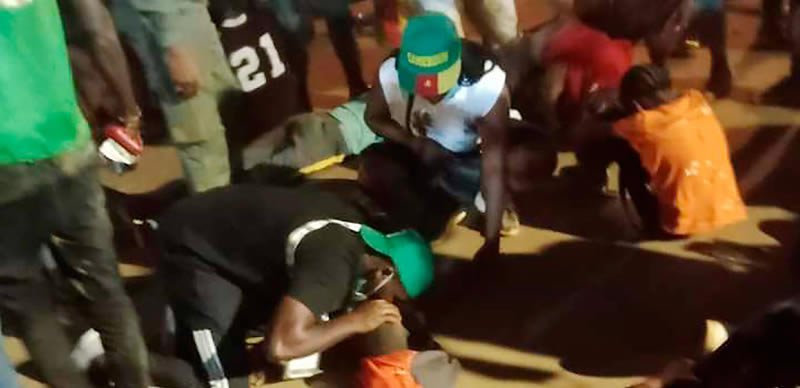
The Africa Cup of Nations quarter-final match due to be played at the Olembe Stadium in Yaounde on Sunday will be switched to another venue after Monday’s deadly crush, African football supremo Patrice Motsepe revealed and called for an investigation into the tragedy.
“The game that is scheduled for Olembe Stadium on Sunday…is going to take place at Ahmadou Ahidjo” stadium, also in Yaounde, said Confederation of African Football (CAF) president Motsepe at a press conference.
“There must be a committee set up to investigate what happened and to find out who was supposed to do what. We want that report by Friday,” the South African added, saying there would be “zero tolerance on circumstances which could result in people being injured or losing their lives”.
Eight people died and 38 were injured as fans attempted to enter the Olembe Stadium where the hosts Cameroon were playing the Comoros, according to figures released by the country’s health ministry.
President Paul Biya has ordered an investigation into the crush, “so that all light is shed on this tragic incident,” Cameroon’s communications minister said.
Although crowds at the 60,000-seat stadium had been limited to 60 percent of capacity for the tournament because of the coronavirus pandemic, the cap is raised to 80 percent when Cameroon’s Indomitable Lions play.
“Eight deaths were recorded, two women in their 30s, four men in their 30s, one child, one body taken away by the family,” said a preliminary health ministry report obtained by AFP.
Communications Minister Rene Emmanuel Sadi said 38 people were injured, including seven seriously.
A baby was reportedly trampled by the crowd, the ministry added. The infant was “immediately extracted and taken to Yaounde General Hospital” and was in a “medically stable” condition, it added.
The tragedy happened at gates where final ticket checks are supposed to take place.
“It was when the police opened the gates that people fell and others trampled on top of them,” said Professor Andre Omgbwa Eballe, director of the Olembe district hospital who attended the match.
“I saw the bravery of the Cameroonian people. People were resuscitating others, doing mouth to mouth, otherwise there would have been more deaths,” he told AFP TV.
– ‘Complete chaos’ –
One man in his 30s who was caught up in the crush told AFP that it was “complete chaos” at the entrance to the stadium as supporters without tickets tried to force their way in.
“I arrived a quarter of an hour before kick-off. I had my ticket, but all of a sudden a group of people without tickets arrived and tried to force their way through and we found ourselves pushed up against the fences,” said the supporter, who gave his name as Stephane.
“I was crushed up against a woman who said she couldn’t breathe. Eventually the gate gave in and I was able to get through, but it was complete chaos.”
Motsepe said that CAF had not considered cancelling the rest of the tournament but had contemplated the idea of postponing the last-16 ties scheduled to be played on Tuesday.
Instead, the tie between Senegal and Cape Verde and Morocco’s game against Malawi will both go ahead, with a minute’s silence for the victims observed before each.
Cameroon was initially meant to host the Cup of Nations in 2019, but the event was moved to Egypt over concerns the country’s stadiums were not ready.
CAF cited delays in the construction of stadiums and infrastructure projects, as well as question marks over security.
Overcrowding at football matches around the world has resulted in scores of deaths.
Thousands of fans in the Egyptian capital Cairo in 2015 attempted to enter a stadium to watch a game, triggering panic as police fired tear gas and birdshot, resulting in 19 dead.
In April 2001, 43 people died in a stampede at Johannesburg’s Ellis Park stadium during a game between Orlando Pirates and Kaizer Chiefs.
In chaotic scenes at last year’s European Championship final between England and Italy in London, some 2,000 ticketless fans were found to have gained access to Wembley Stadium, with an independent review later finding that a tragedy was only narrowly averted.
(AFP)





